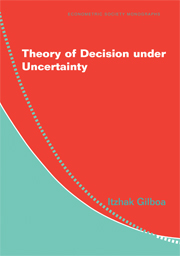Book contents
1 - Motivating Examples
Published online by Cambridge University Press: 05 January 2013
Summary
Let us start with a concrete question such as what is the probability of another war in the Middle East erupting before December 31 of the current year? Of course, the focus should not be on this particular problem, but on the way we address it and, in fact, on its meaning. Similarly, I could ask you what is the probability of a stock market crash in the NY Stock Exchange during the next month. In both examples we have to define precisely what is meant by “war,” or “stock market crash,” so as to make the question well defined. Assume that we've done that. How would you approach the problems?
I believe that these are very complicated questions, not only because they have to do with complex processes, each involving many factors, but mostly because they are conceptually hard to deal with. To appreciate the difficulties, it may be useful to contrast this class of questions with three others. For concreteness, consider the following four questions, which, I will later argue, are in increasing order of conceptual difficulty:
I'm about to toss a coin. What is the probability of it coming up head?
I consider parking my car on the street tonight. What is the probability that it will be stolen overnight?
I am about to undergo a medical operation. What is the probability that I will survive it?
[…]
Information
- Type
- Chapter
- Information
- Theory of Decision under Uncertainty , pp. 3 - 4Publisher: Cambridge University PressPrint publication year: 2009
